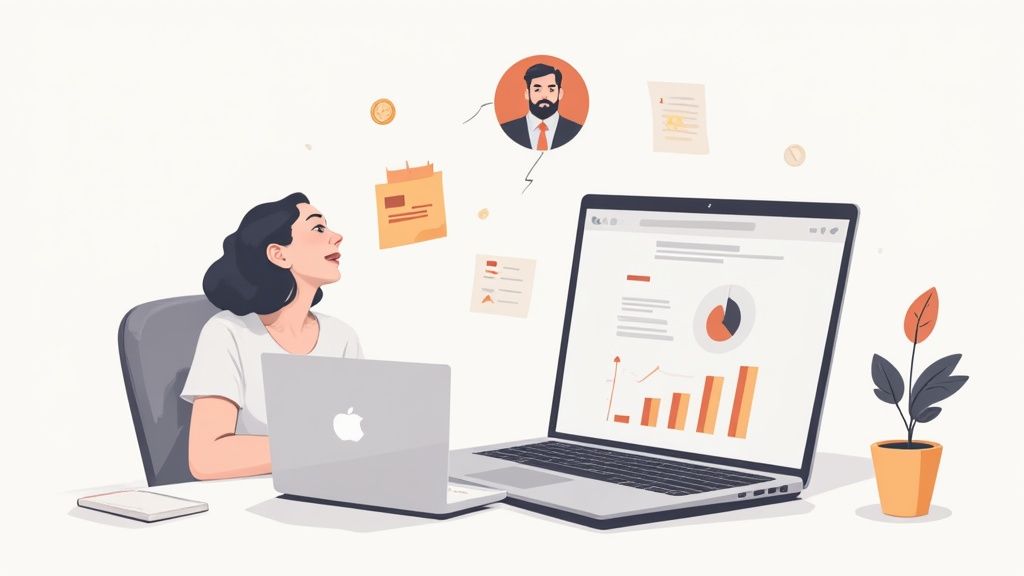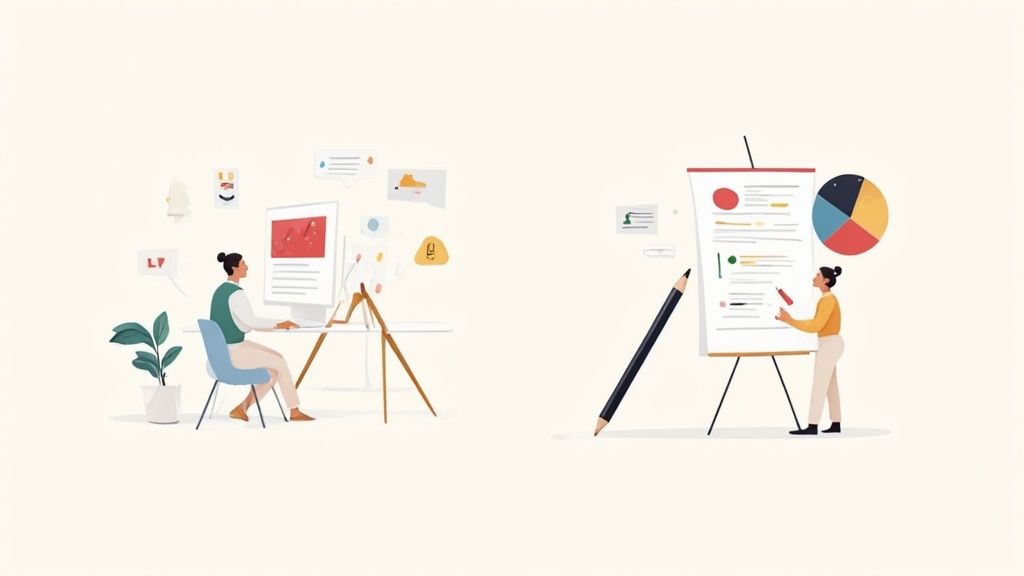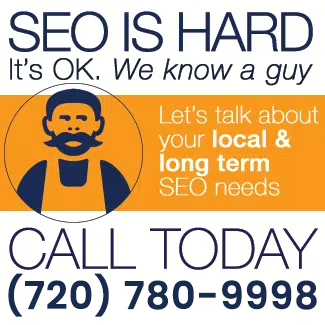Trying to pin down the website cost for a small business can feel like trying to nail Jell-O to a wall. The prices seen online are all over the map. A good website is an investment in your business, not just another line item on an expense sheet. The final price tag reflects the real work and value that goes into building something that actually gets you more customers.
At The Affordable Web Guy, we build websites that answer these questions from day one. Our whole focus is on creating a powerful online presence that delivers real, measurable value for your small business. Learn more about our website design pricing and see how we can help you grow.
After you understand what you’re actually paying for, creating a realistic budget gets a whole lot easier.
Understanding Your Small Business Website Investment
Think of your website as your digital storefront. Just like a physical shop, you can go super bare-bones or build something elaborate. For a small business, that investment covers more than the initial design. It is everything from your website’s address (the domain) to all the behind-the-scenes work that keeps it running smoothly and visible to the people you want to reach.
The whole point is to build a marketing machine that works for you 24/7.
A website built with a real strategy behind it is designed to hit your specific business goals. It is not just about looking pretty; it is about attracting the right visitors and getting them to pick up the phone or fill out your contact form. This is where you’re not just buying a product—you’re investing in professional expertise.
What Shapes the Final Price Tag?
So, what actually determines the final cost of a website? The price can swing from a few hundred bucks for a do-it-yourself builder to tens of thousands for a huge, custom project from a big agency. The biggest reasons for that massive range come down to a few key things.
Before we get into the specifics, here is a quick overview of what impacts your budget.
Quick Look at Website Investment Factors
| Investment Factor | What It Covers | Impact on Cost |
|---|---|---|
| Design & Customization | Is it a pre-made design or a completely unique one? | Custom designs cost more but make you stand out. |
| Features & Functionality | Online booking, photo galleries, etc. | The more complex the features, the higher the cost. |
| Number of Pages | How much content and how many pages does your site need? | More pages mean more design and development time. |
| Ongoing Support | Maintenance, security, backups, and regular updates. | A monthly fee that prevents bigger, costlier problems. |
Let’s break down those factors a bit more. The final price is directly hit by:
- Custom Design: A unique look and feel built just for your brand and your customers.
- Number of Pages: The total volume of content and individual pages needed for your site.
- Special Features: Anything beyond a basic brochure site, like online booking or a portfolio gallery.
- Ongoing Support: The important services that handle maintenance, security, and software updates.
A well-planned website is an asset that grows right alongside your business. It’s the foundation of your marketing, built to bring in new customers and build your brand’s credibility day in and day out.
For many small businesses, coming up with the cash for a quality website can be a hurdle. One way to ease that financial load is by exploring free grants for small businesses, which can provide funds you do not have to pay back.
Working with a straightforward partner like The Affordable Web Guy helps you make sense of all these factors. We make sure your investment lines up with your real-world business goals from day one.
Breaking Down The Foundational Website Expenses
Before you even think about design, colors, or what to write on your homepage, every website has a few non-negotiable costs. Think of them like the rent and utilities for a physical shop. You have to pay them just to keep the doors open online. Getting a handle on these foundational costs is the first step to building a budget that makes sense.
What Is A Domain Name?
First up is your domain name. This is your address on the internet, like www.yourbusiness.com. It is how people find you directly, and it is a huge part of your brand.
Next, you need website hosting. If the domain is your address, hosting is the actual building where your website “lives.” It is the service that stores all your website’s files and keeps it running 24/7 for anyone who visits.
Your Domain Name Is Your Digital Address
Picking and paying for a domain name is usually pretty simple. It’s a small fee you pay once a year. The key is to choose a name that is easy for your customers to remember and type.
A memorable name means people can find you without having to Google you first, which is always a good thing. Once you buy it, that yearly renewal keeps it yours.
Website Hosting Keeps The Lights On
Hosting is what keeps your website online and available to everyone. When you work with a professional service, reliable hosting is almost always part of the deal. This makes sure your site has what it needs to load fast and will not crash when you get a bunch of visitors at once.
Good hosting is not just a technical detail; it’s very important. It directly impacts how people experience your site. A slow or broken website will send potential customers running to your competition in a heartbeat. It is an operating cost you absolutely cannot skip.
Securing Your Site and Building Trust
Another piece of the foundation is an SSL certificate. This is the little thing that puts the padlock icon in the browser bar and changes your site’s address from http to https. An SSL certificate scrambles the data passed between your website and your visitors, which is needed for security.
It’s not just for show. Search engines like Google prefer secure sites, and most web browsers now flash a big warning to users if a site is not protected. Having an active SSL certificate is not really optional anymore—it is just standard for any business that wants to be taken seriously.
A professional website that’s properly hosted and secured sends a clear signal to customers: this business is legitimate and trustworthy. It’s the digital version of having a clean, safe, and well-lit storefront.
These three things—domain, hosting, and SSL—are the absolute baseline for any website project. Knowing what they are and why they matter helps you understand where your money is going. When you partner with someone who focuses on small businesses, these details are just handled for you.
Certainly, you can try a do-it-yourself builder, but there’s a world of difference between a DIY site and a professionally built one. A pro focuses on what actually brings in business—attracting the right people and turning them into paying customers.
It’s More Than Just a Pretty Picture
Think of a well-built website as your best salesperson. It never sleeps, never takes a day off, and it’s the very first thing a potential customer interacts with. A professional design is not just about picking nice colors; it is built from the ground up with your ideal customer in mind. It creates a feeling that resonates with them and immediately signals that your business is credible and trustworthy.
A custom design is all about strategy. It is about creating a clear path that guides visitors to do something specific, like calling your office or filling out a form. This turns your site from a passive online brochure into an active part of your sales process.
Then there is the other side of the coin: professional development. This is all the work that happens behind the curtain to make sure your site is fast, secure, and reliable. Clean code is not just for tech nerds—it helps your website show up higher in Google searches, making it easier for new customers to find you.
Investing in Quality from Day One
When you’re looking at the website cost for a small business, it is tempting to cut corners on the build. But investing in professional design and development right from the start is one of the smartest moves you can make. It helps you sidestep the common traps of a slow, clunky, or amateur-looking site that scares visitors away before they even learn what you do.
A professionally built site is also designed for the long haul. It is usually built on a solid, flexible foundation like WordPress, which means it can grow and change right along with your business. You end up with a site that not only looks great today but is ready for whatever you throw at it tomorrow.
This strategic approach is what separates a simple online presence from a true business asset. You’re building a digital home for your brand that welcomes visitors and, more importantly, gets the job done.
So, What Does a Professional Site Actually Cost?
Budgeting for a professional build means knowing what you’re paying for. A typical project for a small business includes custom design, development, setting up key pages (like services and contact forms), and integrating a content management system. These projects generally fall into a predictable price range.
This investment covers the expertise needed to build a site that is not just pretty but is also technically sound and optimized to perform. You’re paying for a complete service that delivers real, long-term value.
Planning for Long-Term Website Maintenance
Launching your new website feels like crossing the finish line, but really, you’re just starting the race. A website is not a project you can just “set and forget.” Think of it more like a brand-new work truck; it needs regular check-ups and care to keep running smoothly and safely on the road. This ongoing attention is what we call website maintenance.
If you do not plan for long-term care from the get-go, that beautiful site you just paid for is at risk. Technology moves incredibly fast. A site that looks great today can feel old, break down, or become a target for hackers in just a short time. Factoring in maintenance from day one is just smart business.
What Does Website Upkeep Actually Involve?
So, what are we even talking about when we say “maintenance”? It is a short list of regular tasks we handle behind the scenes to keep your site healthy, secure, and working like a champ. Just like your truck needs oil changes and tire rotations, your website needs consistent technical tune-ups.
This is not about redesigning your homepage every month. It is about the important, behind-the-curtain work that stops your site from going down, getting hacked, or just plain breaking.
These ongoing tasks usually boil down to a few key things:
- Software Updates: Your website is built on software, usually WordPress, which is always being improved. Regular updates patch security holes, fix bugs, and sometimes add useful new features.
- Security Scans: Hackers and bots are constantly sniffing around for weak spots. We run routine security checks to spot threats and stop attacks before they can mess up your business.
- Data Backups: If the worst happens—and sometimes it does—having a recent backup of your website is your get-out-of-jail-free card. Regular backups mean we can get you back online fast if something goes wrong.
- Performance Checks: We keep an eye on your site’s speed and make sure everything is loading correctly for your visitors. This is huge for keeping customers happy and for getting found on Google.
A well-maintained website sends a powerful message to your customers: you’re professional, reliable, and you care about their experience and security.
Why Good Maintenance Is a Smart Investment
Letting your website go without maintenance is one of the costliest mistakes you can make. An out-of-date site is like leaving the front door of your shop wide open for hackers. That can lead to expensive cleanup jobs and a huge loss of customer trust. Even tiny glitches can be enough to send a potential customer straight to your competitor.
On the flip side, a well-cared-for website performs better in search engines. Google loves sites that are secure, fast, and easy for people to use. Consistent maintenance helps you tick all those boxes, giving you a much better shot at being found by people searching for what you do.
A maintenance plan protects the money you spent building the site in the first place. It is a predictable, small cost that helps you avoid unexpected—and often much, much larger—bills down the road. It makes sure the marketing tool you paid for keeps working for you, day in and day out.
Understanding these needs upfront helps you create a realistic budget for your online presence. It also shows why having a pro in your corner is valuable long after the site goes live. A dedicated service like The Affordable Web Guy handles all of this for you, so you can focus on running your business, not your website. For more specifics on what our plans cover, you can review our website pricing options.
Why WordPress Works for Small Business Websites
When you’re trying to figure out the total website cost for a small business, the technology you build it on matters a lot for its long-term value. For most small businesses, WordPress is the smartest choice. It hits that sweet spot of flexibility and control, setting you up for growth without boxing you into a system you cannot change later.
Unlike some platforms that just “rent” you space, a WordPress website is something you actually own. It is your digital property. That means you get the final say on how it looks, what it does, and where you host it. This ownership is a huge deal, giving you the freedom to pivot as your business grows.
A Foundation Built for Growth
One of the best things about WordPress is its incredible flexibility. Your website should not feel like a straitjacket; it needs to grow right alongside your business. With WordPress, you are not stuck with a rigid, unchangeable structure.
Want to add a new service page? Start a blog to share what you know? Add a gallery of your latest work? The platform makes it all pretty straightforward. This ability to expand easily means your initial investment keeps paying off for years. It is a system designed to support your success, not hold you back.
A professional partner who lives and breathes WordPress, like The Affordable Web Guy, can build a site that works for you today while being ready for whatever you dream up tomorrow. You get a solid foundation that is ready for anything.
You Are in Full Control
In business, owning your assets is just as important online as it is offline. When your website is built on WordPress, you hold the keys. You’re not just renting space on someone else’s platform, which means you can pack up your site and move it to a new hosting provider anytime you want.
That control covers every part of your site. You get the final word on design tweaks, new features, and how your content is laid out. This kind of autonomy is important for any serious business owner who wants to steer their own ship.
Your website is one of your most important marketing tools. WordPress ensures that this tool belongs entirely to you, giving you the power to make strategic decisions without being limited by a third-party platform’s rules or restrictions.
That level of ownership gives you real peace of mind, knowing your online headquarters is truly yours.
Well-Liked by Search Engines
What good is a website if nobody can find it? Right out of the box, WordPress is built with code that search engines like Google can easily read and understand. That is a massive head start when it comes to getting your business noticed online.
From a technical standpoint, the platform supports all the best practices for search engine optimization (SEO). This includes things like mobile-friendly design, fast loading speeds, and a logical site structure. When you work with a professional, they make sure your WordPress site is set up correctly to take full advantage of these built-in perks.
This search-engine-friendly nature means your site has a much better shot at ranking for the terms your customers are actually searching for. It is a key reason why WordPress powers such a huge chunk of the web. Choosing WordPress gives you a powerful, professional, and sustainable platform for your business.
Finding the Right Partner for Your Website Project
Choosing someone to build your website is a huge decision. It’s about way more than just the initial price tag. You’re not just buying a thing; you’re starting a partnership with someone who should be just as invested in your success as you are. The right expert takes the time to actually learn what your company does, who your customers are, and what you are trying to achieve.
A great web partner does not just slap a few pages together and call it a day. They should lay out a clear strategy for how your new site will become a tool for bringing in business. They need to explain—in plain English—how the design and layout will help turn casual visitors into paying customers.
It’s More Than Just a Pretty Website
The real goal here is to find a pro who sees your website as the core of your marketing. This means their focus is on delivering real, measurable business value, not just a slick-looking design. Their job is to make sure the money you invest actually comes back to you by helping your business grow.
This is the whole philosophy behind what we do at The Affordable Web Guy. We focus on building strategic, professional websites that work hard for small businesses. A website should be your best employee, and the right partner makes sure it is.
Asking the Right Questions
When you start talking to potential web designers, pay attention to how they approach the conversation. A true partner will be curious. They will want to dig into what makes your business tick and will ask questions that show they’re thinking about your long-term success, not just a quick project.
Here are a few dead giveaways you are talking to a great web design partner:
- They want to understand your business goals before they even mention design.
- They have a clear, straightforward process and can tell you what to expect.
- They build on a flexible platform like WordPress that can grow with you.
- They talk about ongoing maintenance to protect your investment for the long haul.
Your website is your digital handshake, your 24/7 salesperson, and your main marketing hub all rolled into one. The right partner gets this and builds a site that can handle that responsibility, turning your idea into a real business asset.
The best partner is someone who feels like an extension of your own team. You want someone dedicated to building a website that does not just look professional but actively helps your bottom line. When you choose an expert who is genuinely committed to your growth, you are making one of the smartest investments you can for your business’s future.
Common Questions About Small Business Website Costs
When you start looking into getting a website, a few questions always pop up. It’s completely normal. Understanding the answers helps you set a real-world budget and see why a professional site is more than just an online pamphlet—it’s a tool for your business. Let’s break down the common ones.
What Is a Realistic Budget for a Small Business Website?
Honestly, this depends on what you need the site to do. A simple, one-page “online business card” is one thing, but a website built to actually attract customers and generate leads is a different animal altogether. It is an investment, not just an expense.
The real key is to stop thinking about the cost and start thinking about the return. A website that brings in even a handful of new clients a month pays for itself pretty quick. The best way forward is to have a straight talk with a professional about your goals to get a clear estimate. You can get a better idea of how we price things by reviewing our website cost information.
Why Are Ongoing Maintenance Costs Part of the Budget?
Think of your website like a car. You would not drive it for years without an oil change or a tune-up, right? Website maintenance is the same idea—it protects your investment. The internet is always changing, with new security holes and software updates popping up constantly. A maintenance plan is your defense.
This is not just busy work. It covers important tasks that keep you safe:
- Security Monitoring: We’re actively watching for and blocking people trying to hack your site.
- Regular Backups: We create copies of everything, so if the worst happens, we can get you back online fast.
- Software Updates: We keep WordPress and all its moving parts up-to-date to patch security flaws before they become a problem.
This ongoing care keeps your site humming along smoothly, protects it from getting wrecked, and makes sure it works for everyone, no matter what browser or device they’re using.
How Does a Professionally Built Website Help with SEO?
When a professional builds your site, they’re thinking about search engine optimization (SEO) from the ground up. It is baked right in. This means clean code that search engines like Google can actually understand, a design that works perfectly on a phone, and pages that load fast. These are not just fancy features; they are the technical table stakes for ranking well.
A pro also organizes your site logically, making it easy for both people and search engines to find what they’re looking for. This strong foundation gives your business a huge head start in getting found online.
This initial work does not guarantee you will be #1 tomorrow, but it clears the road. It helps that there are no technical roadblocks stopping you from being found by the people who are actually looking for what you do.




